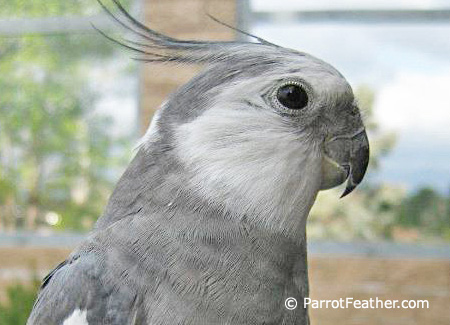Why Does My Cockatiel Shiver?

Listed below are common behavior problems reported in pet cockatiels. Simply click the question below for more information. If your questions cannot be found here, please visit or main cockatiel section or stop by our parrot forum and post your questions.
- Why Does My Cockatiel Bite?
- Why Does My Cockatiel Scream?
- Why Does My Cockatiel Hiss?
- Why Does My Cockatiel Stand On One Leg?
- Why Does My Cockatiel Open His Mouth?
- Why Does My Cockatiel Fly Backwards?
- Why Does My Cockatiel Shiver?
- Why Does My Cockatiel Shake Its Head?
- Why Does My Cockatiel Bang His Beak?
- Why Does My Cockatiel Flap His Wings?
A shivering cockatiel
Probably one of the more common questions asked about a cockatiel’s behavior is based on birds shivering. In a normal and healthy cockatiel this is quite normal. In fact, humans also shiver but it’s usually not noticeable like in birds. Many owners discover their bird shaking and believe that there may be something wrong with their bird when in fact it’s a normal behavior. The shivering is more noticeable on the bird’s wings and thighs. In larger birds such as African Greys, Amazons, or Macaws, shivering can be seen more readily. This happens just because they are simply larger animals.
Though a slight shaking is normal, the owner should still use their
best judgment when observing a shivering cockatiel. Shivering from
illness is much more pronounced and the cockatiel will look as if it's
lethargic. If the wings are drooping, the bird is sitting ruffled, is
not responsive to human interaction, or its tail is bobbing, immediate
attention should be given by a veterinarian. Usually when these symptoms
are seen, the bird is experiencing some sort of bacterial infection or
illness. If not taken to the veterinarian in time the bird could die.
If the bird cannot be seen by a veterinarian immediately, the bird
should be placed under a heating lamp or placed into a brooder until the
bird is taken to an avian veterinarian for further care. The best weapon
when treating an ill cockatiel is raising the temperature to between
85°F to 90°F. This can be achieved with a digital thermometer, a heating
light, brooder, or an incubator. If the bird is slightly opening its
wings and panting, the heat is too high and needs to be reduced until
the cockatiel is not panting. All food and water dishes should be placed
into the brooder so the bird has easy access to them.
While waiting for the bird to be seen by a veterinarian, it is important
the bird not be handled too much as it needs to rest. Any excessive
stress placed upon the bird could do more harm than good.
It is important the owner know that shivering can also be a symptom of
excessive stress, excitement, or irritation.




